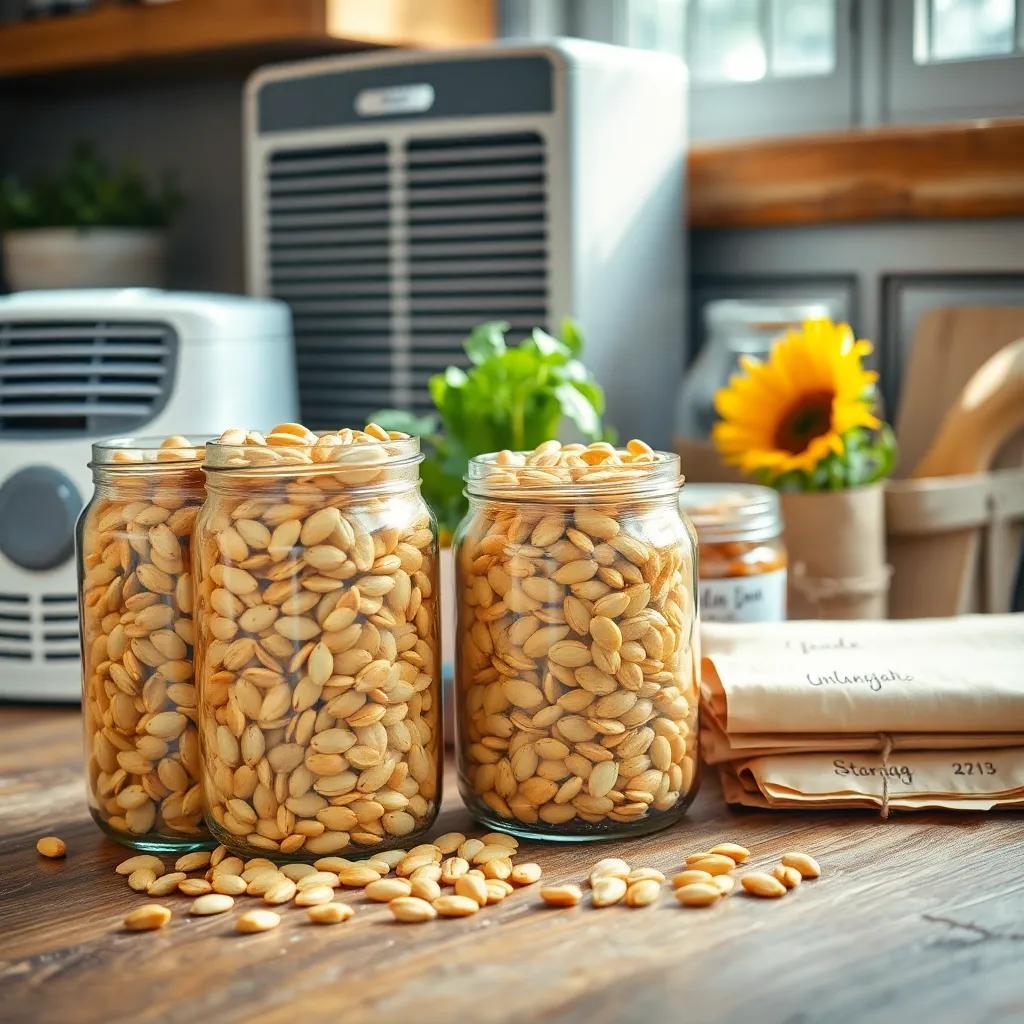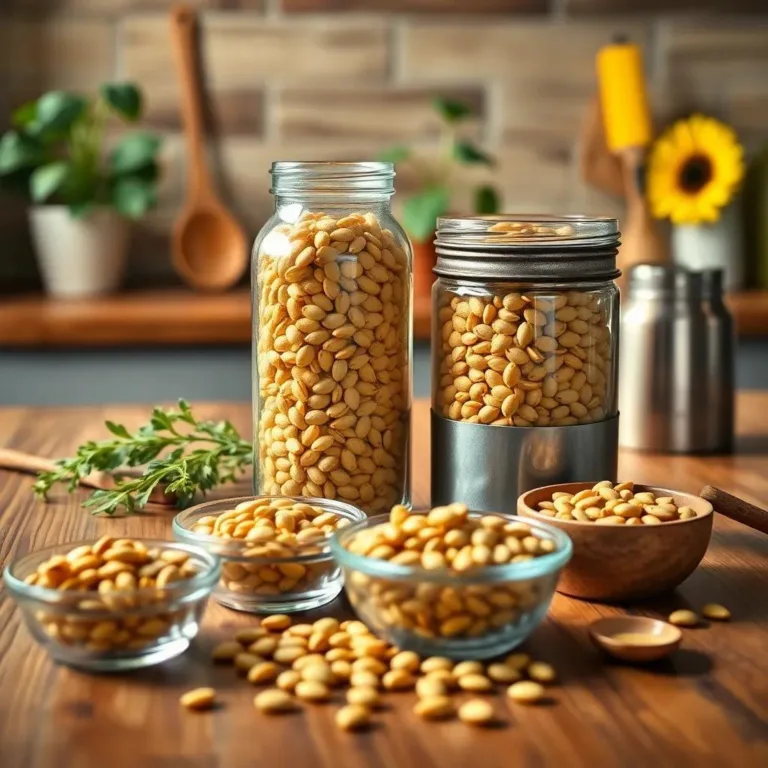Sunflower seeds are more than just a tasty snack—they’re little powerhouses of nutrition! If you’re like me, you want to keep them fresh and crunchy for as long as possible. Ready to learn how to store your seeds like a pro and spot any sneaky signs of spoilage? Let’s dig in!
Factors That Affect Sunflower Seed Shelf Life
When it comes to sunflower seeds, several factors play a big role in how long they stay fresh. Believe me, knowing these will help you keep your seeds in tip-top shape! Let’s break them down!
- Moisture: This is a biggie! If your sunflower seeds are stored in a damp environment, they can spoil quickly. It’s like inviting mold to the party—no one wants that! Always store them in a dry place. Consider using a dehumidifier if your home tends to be humid.
- Temperature: Where you keep your seeds matters too. Ideally, they should be in a cool, dark spot. Heat can cause the seeds to go bad faster. So, avoid putting them near the oven or where the sun shines directly. A pantry works great!
- Air Exposure: Air is the enemy of freshness! When sunflower seeds are exposed to air, they can become stale and lose flavor. That’s because the fats in the seeds can oxidize. Using airtight containers can really save the day here!
- Packaging: The original packaging can also influence shelf life. Seeds that come in light-proof and airtight bags usually last longer than those in flimsy bags. So, always opt for quality packaging.
- Seed Quality: Lastly, the quality of the sunflower seeds you buy can affect their longevity. Choose seeds that have been harvested at the right time and stored properly. It really pays off!
By keeping these factors in mind, you can enjoy your sunflower seeds for a long time! Who doesn’t love a crunchy, fresh snack?
Proper Storage Techniques for Sunflower Seeds
Storing sunflower seeds properly is key! You wouldn’t want to bite into a bag of stale seeds, right? Let’s go over some easy and effective ways to store sunflower seeds, so they stay fresh and tasty!
- Choose the Right Container: Always opt for airtight containers made from glass, plastic, or metal. This helps block out moisture and air, keeping your seeds fresh. I usually go for a glass jar—it looks nice and does the job well!
- Keep Them Dry: Before storing, make sure the seeds are completely dry. If they feel a bit damp, spread them out on a paper towel for a few hours. It’s like giving them a little spa day before they get cozy in their new home!
- Ideal Location: Find a cool, dark spot for your seeds. A pantry or cupboard works best. Try to avoid putting them near heat sources like the stove or oven, which can make them spoil faster.
- Avoid Temperature Fluctuations: It’s best to store sunflower seeds at a consistent temperature. I keep mine in a stable environment—no fridge for me! The temperature changes can affect their taste and quality over time.
- Label and Date: Trust me, labeling is super helpful! Write down the date you stored your seeds. This way, you can keep track of when they might need to be refreshed.
- Keep Away from Strong Odors: Sunflower seeds can absorb smells from their surroundings. So, keep them away from strong-smelling foods. You want that nutty flavor, not a hint of garlic!
By following these storage tips, you can enjoy your sunflower seeds anytime without worrying about spoilage. Happy munching!

Identifying Signs of Spoiled Sunflower Seeds
As someone who loves snacking on sunflower seeds, I want to share how to tell when they’re no longer fresh! Nobody wants to bite into a spoiled seed—it can ruin your day! Here are some signs to watch out for:
- Smell: The first clue is the aroma. Fresh sunflower seeds have a nutty, mild scent. If they smell rancid, sour, or just plain off, it’s time to toss them. A stinky seed is a no-go!
- Color and Appearance: When checking your seeds, look closely. Fresh seeds have a nice, dark brown or black shell. If you see any gray or green spots, that’s a sign of mold. Moldy seeds should be thrown away immediately!
- Taste and Texture: If you’re brave enough to sample them, notice the flavor! Fresh seeds should taste nutty and flavorful. If they taste bitter or sour, they’ve likely gone bad. Also, check the texture! If they feel soft, rubbery, or slimy, it’s best to say goodbye.
- Pests: Keep an eye out for critters! If you spot any bugs or insects hanging around your sunflower seeds, it’s time to get rid of them. Pests can spoil seeds quickly and make them unsafe to eat.
By being aware of these signs, you can always enjoy delicious, fresh sunflower seeds! Trust me, it’s better to be safe than sorry!
Tips to Extend the Shelf Life of Sunflower Seeds
Want to keep your sunflower seeds fresh for as long as possible? I’ve got some handy tips to help you extend their shelf life! Let’s dive right in!
- Buy Smaller Quantities: Instead of grabbing a giant bag of seeds, consider buying smaller amounts. This way, you’ll finish them while they are still fresh. You won’t have to worry about any seeds going stale!
- Roast Your Seeds: Roasting sunflower seeds can be fun and delicious! When you roast them, you remove extra moisture, which can help them last longer. Just spread them on a baking sheet, roast at a low temperature (about 300°F or 150°C) for 15-20 minutes, and let them cool before storing.
- Use Oxygen Absorbers: These little packets absorb oxygen inside your containers, keeping your seeds fresh. They’re easy to find and make a big difference. Just follow the instructions on the package!
- Refrigerate or Freeze: If you want to store sunflower seeds for a long time, the fridge or freezer is your best friend! Just make sure they’re in airtight containers to avoid moisture. Let them thaw at room temperature before opening—this helps keep the seeds crunchy!
- Rotate Your Stock: If you have multiple bags or jars of seeds, practice the “first in, first out” rule. Use the oldest seeds first and keep your stash fresh!
By following these tips, you can enjoy your sunflower seeds for a longer time. Happy snacking!
Frequently Asked Questions About Sunflower Seed Storage
I know you might have some questions about storing sunflower seeds, and I’m here to help! Here are some of the most common questions people have, along with my answers!
Q: What is the best way to store sunflower seeds?
A: The best way to keep sunflower seeds fresh is to store them in an airtight container in a cool, dry place. This helps prevent them from becoming rancid and extends their shelf life!
Q: Can sunflower seeds go bad?
A: Yes, they can definitely go bad! If exposed to moisture, heat, or air, sunflower seeds can spoil and become rancid. Proper storage is key to keeping them fresh!
Q: How can I tell if sunflower seeds are spoiled?
A: Look for signs like a rancid smell, bitter taste, or any discoloration. If they smell off or look moldy, it’s best to toss them in the trash!
Q: Are there any signs that sunflower seeds are still good to eat?
A: Absolutely! If your seeds smell fresh and nutty and taste delicious, they’re likely good to eat. Also, check the expiration date if you have a store-bought package!
Q: What is the typical shelf life of sunflower seeds?
A: When stored properly, sunflower seeds can last up to 6 months at room temperature, or up to a year in the refrigerator or freezer. Just keep an eye on them!
I hope these FAQs help clear up any questions you have about storing sunflower seeds! Remember, a little care goes a long way in keeping them fresh and tasty!

